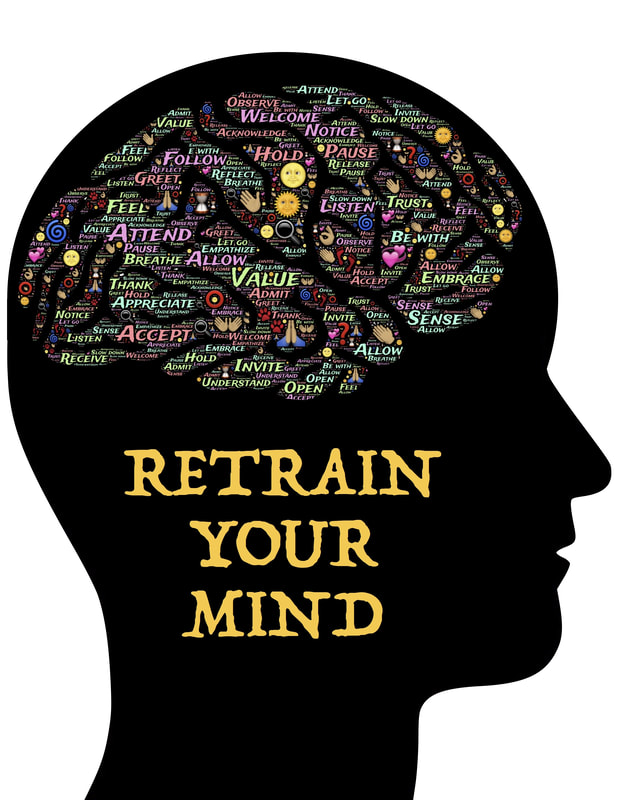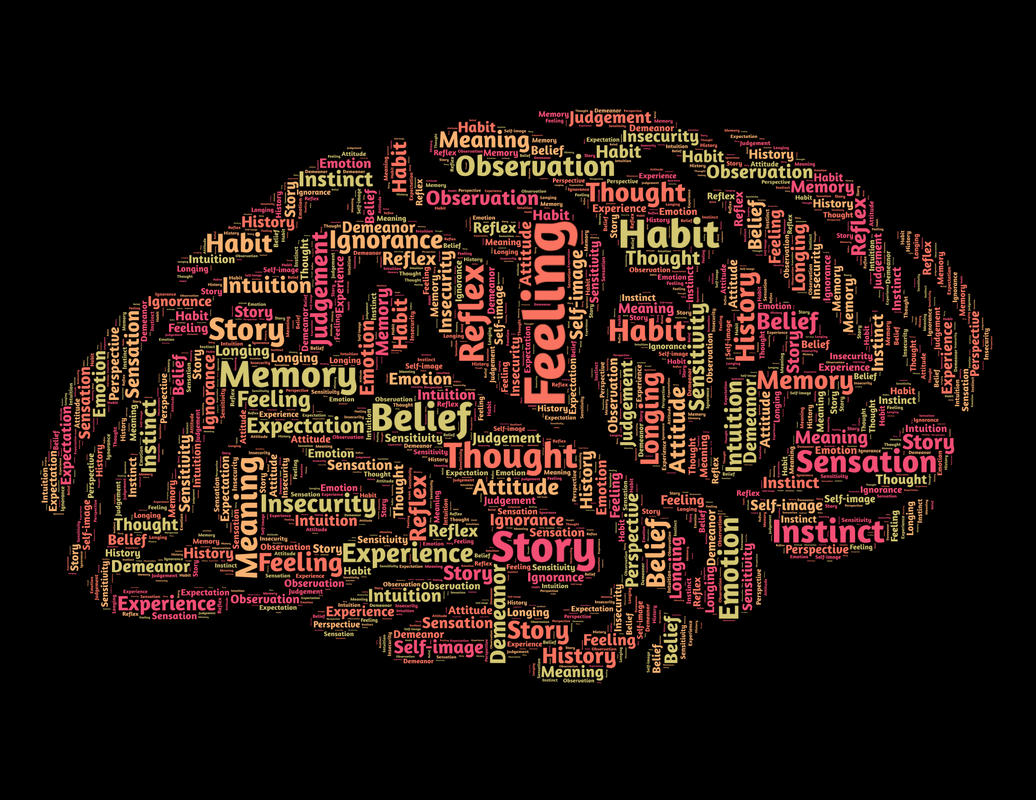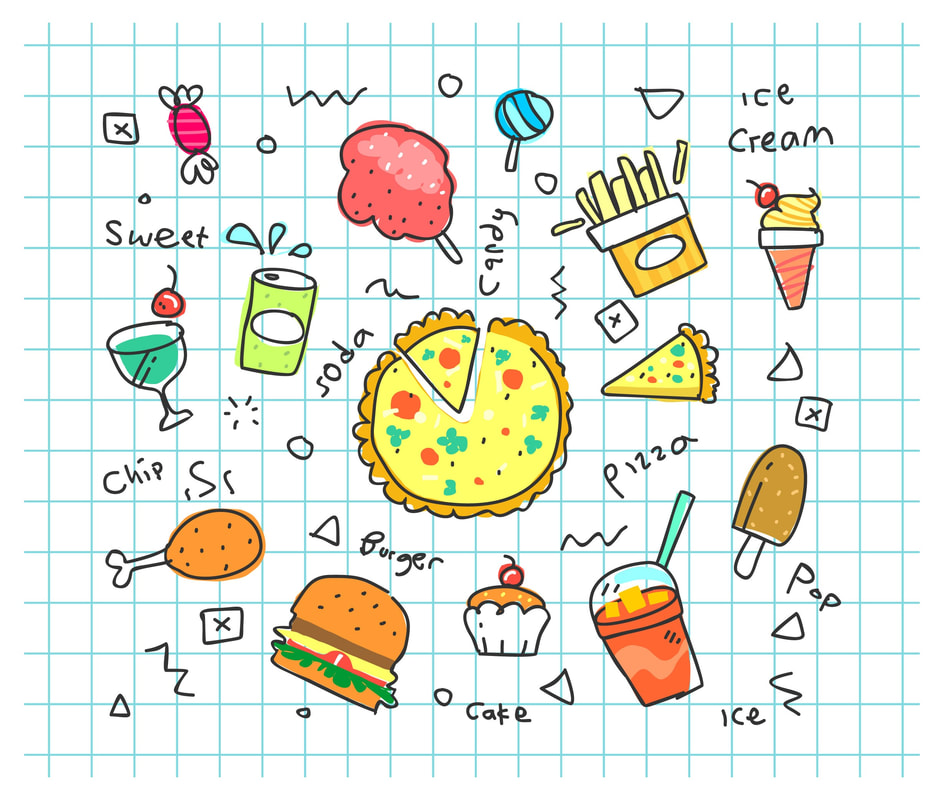Specific strategies to encourage mindful eating1. Acknowledge that all forms of non-hungry eating are normal and have a biologic basis. You are normal. You are not weak. You are human and you are not alone.
2. Understand the limitations of willpower. We all have a limited amount. Knowing your limits is the key so that you can plan accordingly. What things tend to drain you? When is your willpower reserve likely to be low? What specific actions can you adopt so that making healthy food choices is easy not just during the best of times, but also at the worst of times? For example, if you have to buy a trigger food, keep it out of sight or make it harder to reach. Research has shown that simply making a food physically less accessible is a viable deterrent. Meal plan or have quick healthy food options available always. When you are tired or drained, it is unlikely you are going to have the energy or motivation to cook something. You're more likely to reach for the crappy, quick option. 3. Stop and think before you put it in your mouth. Whether we are talking about habitual/boredom eating or emotional eating, the ability to stop in the moment and think about what you are doing and why you are doing it is critical. Initially, this is hard. It takes energy and effort. Our brains (which are basically lazy) will resist. It has evolved to conserve energy and resources for more important stuff. But don't worry. Eventually, it will get easier as you adopt new habits and learn new, better strategies for dealing with stress and emotions. 4. Whenever possible, create distance between you and the impulse or emotion. Angry and reaching for the Ben and Jerry's? Set a timer. Go for a walk. Take a bath. Drink a cup of tea. Write down your emotions/motivation in a journal. If you can create space between you and the impulse or emotion, it will likely pass. And, you can even give yourself permission to eat whatever it is you were going to eat after that "cooling down" period. Whatever decision you ultimately make will be the result of a conscious choice that takes into account the cost and benefit of the behavior rather than a knee-jerk reaction. 5. Learn positive ways to deal with stress. Coping strategies are important. Learning to deal with stress in a healthy way is the goal. Meditation, yoga, exercise, reading, relaxation, a hot bath, a cup of tea, aroma therapy, journaling, traditional therapy, a massage, getting adequate good quality sleep. There are many positive ways to deal with stress. The key is to find a more positive way to deal with negative emotions. Again, this takes awareness, mindfulness, and practice. Lots and lots of practice. Yet over time, you will literally rewire your brain, and instead of turning to food, you will begin to turn to these other strategies. 6. Be kind to yourself. Always. Kenny Rodgers was onto something with his lyrics from the Gambler. "You've got to know when to hold'em. Know when to fold'em. Know when to walk away. Know when to run." Sometimes giving into a craving is the best thing you can do. Why? Because, sometimes that craving serves a purpose. We've all tried to resist a craving for something we really wanted not because we were hungry but because we wanted it, damn it. Instead, we ended up eating 10 other things we didn't want, only to end up eating what we really wanted in the first place. Food isn't just about eating calories. Food has a cultural and emotional context. And sometimes the benefits of eating that cookie outweigh the costs. So eat the cookie and then move on. Not everything you put in your mouth has to qualify as a health food or satisfy hunger. I personally like the 80/20 rule. The idea is that 80% of your choices should reflect an effort to nourish, while the other 20% can be just because you enjoy it or you want it because it makes you feel good. By allowing yourself these indulgences, you minimize the unproductive and often toxic effects of guilt. Along the same lines, don't strive for perfection. Sometimes good enough is good enough. 7. Focus on nourishing your body, not punishing it. Food is beautiful. It tastes good. We need it to survive. It has a cultural and emotional context. Eating it is an enjoyable experience. There is no doubt that our food choices often reflect our complicated relationship with food. We've been thrust into an unnatural environment where food is not only available 24/7. Furthermore, much of the food out there is unhealthy food that has been engineered to make it irresistible and then aggressively marketed by companies who are all to happy to exploit our weakness if it increases their profits. But that is the world we live in. And in order to honor your health, you need to make mindful choices. This has never been more difficult. Fortunately, it does get easier, especially if you can harness the power of habit to work for you rather than against you. I won't lie. It takes effort. It takes time. There are many forces conspiring against you. In the end, your ability to love yourself and make decisions that honor your health because you do love yourself is critical. Choose foods that nourish. Stop seeing healthy eating as punishment or penance. It's about caring for this awesome body you live in. Stop using your body as a trashcan and making excuses. I just can't help myself, I can't afford to eat healthy. I don't have time to food prep/cook. You can help yourself. Eating healthy doesn't have to be any more expensive than eating unhealthy. You absolutely do have time to take care of yourself. After all, self care is about giving the world the best of you, instead of what's left of you. And this brings us back to mindset. The only way to control what you put in your mouth is to start with your mind. It all starts between the ears.
0 Comments
Now that I know what it is, how do I stop it?In both non-hungry/boredom eating and emotional eating, the first step to getting it under control is to acknowledge that it is a problem. It is also important to recognize that it has a biological basis and is not necessarily a moral failing. Biology is a powerful driver of our behavior. Giving into a craving does not make you a bad or a weak person. It makes you human. It is also important to understand that willpower is a limited resource. We often blame a lack of willpower when we cave to a craving, yet most experts agree that willpower is a finite resource, and while some of us likely have a bigger reserve than others, most of us will reach the bottom of the barrel at some point. When you accept the limitations of willpower and motivation you will begin to appreciate the importance of planning in order to ensure better food choices. Mindfulness is KeyBecause boredom and habitual eating is primarily driven by habit, you have to address the habit. This starts with mindfulness, the ability to be aware in the moment and to make conscious choices rather than simply react. Yes. I know. This is hard. Habits by nature are an attempt for the brain to bypass a mindful state. The point of autopilot is so that you don't have to waste time or energy thinking about it, and the brain will resist your efforts, at least initially.
Unfortunately, the only way to change a habit is to stop yourself in the moment and take inventory of your motivations and your choices. I want a cookie. Okay, are you hungry, tired, or bored? Do you want the cookie simply because it is there and it smells good and it looks good? Does the benefit of eating that cookie (the enjoyment you experience) outweigh the costs (gaining weight)? Sometimes the answer may be yes, and that's okay. The point of mindfulness is to make a conscious decision rather than an automatic one. And it takes practice. Lots and lots of practice. (Don't worry. We will be exploring real strategies in part III of this series). Overcoming emotional eating also requires mindfulness. Emotions like anger, fear, frustration and sadness are normal. They are automatic, and we have no control over the emotions we feel. What we do have control over is how we deal with those emotions. Many of us avoid discomfort at all costs. So when sad, we eat or drink to make us feel better. When angry, we throw things, scream, and/or eat a gallon of ice cream. When afraid, we seek comfort through binge watching Netflix and binge eating pasta. Obviously, eating to sooth ourselves isn't necessarily always a bad thing. Coping mechanisms serve a purpose even if they can have unwanted side effects. But ultimately, while an oxymoron, we must learn how to be comfortable with being uncomfortable. A mindful approach to eating allows us to create distance between ourselves and the emotion or the impulse in the moment. So, I'm angry. Huh. Okay. I don't like how that feels. By creating some distance and allowing yourself to experience the emotion non-judgmentally, you give the emotion a chance to play out. Most emotions peak and then wane. The point is to let the emotion(s) pass without reacting. Again, mindfulness requires awareness, and it takes practice. It's a skill like any other that takes time to master. And it starts with your head. With the story you tell yourself. With the inner dialogue you create and with your attitudes about food, about eating, and about yourself. What is non-hungry/emotional eating?Non-hungry eating is a broad category that essentially refers to eating for reasons other than hunger, such as eating out of boredom or habit. Emotional eating is a form of non-hungry eating in which individuals use food (or liquid calories) to cope with emotions. For the purpose of discussion, the term non-hungry eating will be used to refer specifically to boredom/habitual eating, while emotional eating will be used to refer to eating that is driven by emotions. Obviously there is some overlap between these two categories, but it's still worth differentiating between them since the motivation behind each can be quite different. What causes non-hungry eating?Boredom, habit, and/or access to food is often the driving force behind mindless non-hungry eating. The desire to eat is driven primarily by external cues. Eating a bucket of popcorn at the movie theatre. Devouring a hotdog and cotton candy at the ball park. Finishing off an entire bag of potato chips while binge watching Netflix. Any of these sound familiar? In the case of non-hungry eating, there is generally a trigger. A visual cue. A smell. A ritual that has forever paired a food or eating behavior with a specific activity, like pumpkin pie on Thanksgiving or cake on our birthdays. It could also be driven by the taste of food and/or how that food rewards the brain. What causes emotional eating?Emotional eating is a type of non-hungry eating that generally goes beyond boredom or habit. Food becomes a coping mechanisms. We eat as a way to deal with an emotion. Sadness, anger, frustration, fear. These emotions make us uncomfortable, so we eat in an attempt to blunt that emotion and feel better, if only in the moment. Unfortunately, the foods we choose to self-medicate are often high in fat and sugar, and the relief we get is often only temporary at best and may even leave us feeling worse in the end. Ironically, like drugs and alcohol, fat and sugar have addictive qualities. And while eating a cookie (at least on the surface) is arguably less harmful than taking drugs, in its most severe form, emotional eating can lead to binge eating, a serious eating disorder, as well as weight gain and chronic health diseases like heart disease and diabetes that have detrimental effects on our mental and physical health. Interestingly, emotional eating tends to be more of a problem for women than men. There may be many reasons for this. For example, traditionally women were more likely to be the ones shopping for and preparing foods. A woman also experiences monthly fluctuations in powerful hormones that contribute to cravings for fatty and sugary foods. Furthermore, hormonal shifts associated with pre-menopause and menopause may come into play. Women are also the fatter sex because their bodies were designed to not only provide calories for themselves but also their off-spring. Finally, although this is changing somewhat, the objectification of women's bodies has likely placed pressures on them that contribute to an unhealthy relationship with both their bodies and food. Biological basis for non-hungry eatingBoredom/habitual eating is generally caused by habit. And habits are powerful. They are the brains attempt to conserve valuable and limited resources. It's clear that our ability to switch into autopilot is essential to functioning in a complex world. We'd be overwhelmed without this automatic mode. Unfortunately, many habits are not consistent with our health goals and do not serve our best long-term interests. Emotional eating also has a physiological basis. Once upon a time, the threats we faced didn't just feel like life and death, they were. As a result, when under stress, physical or emotional, our body releases hormones like cortisol and adrenaline. Cortisol in particular can have a profound impact on not only hunger, but the foods we choose to satisfy that hunger. During times of stress, we tend to crave fatty, sugary, high-calorie foods. Our distant ancestors likely had limited access to both sugar and fat, and the foods that did contain these macro nutrients also contained many other essential micro nutrients like vitamins, minerals and phytonutrients. We also had to work a lot harder for our calories back then, unlike today when we are literally surrounded processed foods high in sugar, fat, and calories but lacking in nourishment. Elevated cortisol levels can also impact the quality and quantity of our sleep which further increases cortisol levels. Disrupted sleep also affects leptin and ghrelin, two additional hormones that regulate hunger and satiety. It's a vicious cycle. Finally, increased cortisol levels favors weight gain particularly in the midsection. This belly fat, also referred to as visceral fat, is associated with chronic systemic inflammation, which has been implicated in cancer, heart disease, Alzheimer's, auto immune disorders and diabetes among others. Finally, hormonal fluctuations can impact cravings and food choices as well as how our bodies process those calories. SummaryNon-hungry and/or emotional eating leads to the consumption of food (often unhealthy food) to fulfill a need other than hunger. Most of us engage in some form of non-hungry and emotional eating. It's common and has a biologic/physiologic basis. Occasionally eating out of boredom or because we are stressed is unlikely to cause significant harm, unfortunately, for many, this type of eating is all too common, ultimately contributing to weight gain, the inability to lose weight, and/or the development of life-style related diseases. In a nutshell, it keeps many of us from achieving the best version of ourselves.
|
AuthorShaun Taylor Bevins Archives
April 2020
Categories
|



 RSS Feed
RSS Feed